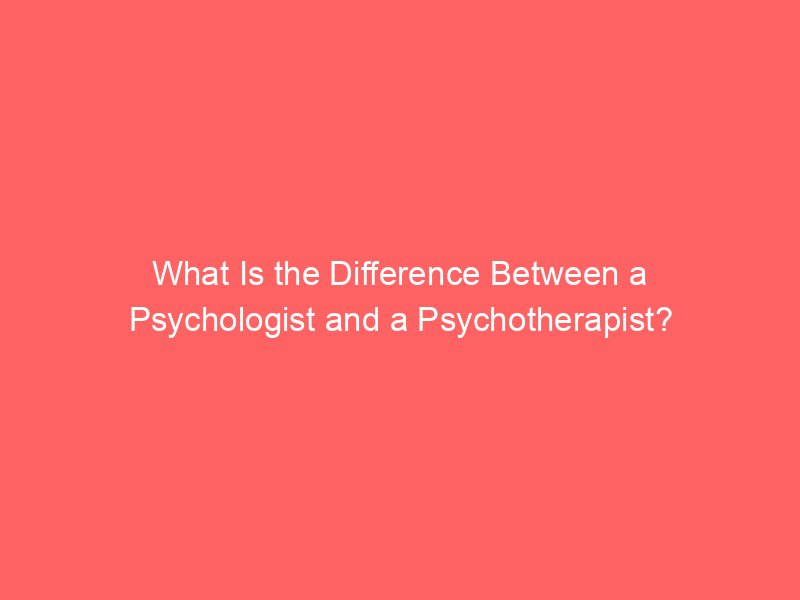The difference between a psychologist and a psychotherapist lies mainly in their training, scope of practice, and approach to mental health treatment. Psychologists have formal education in psychology and can conduct assessments and diagnoses, while psychotherapists focus on talk therapy and emotional support, often without a regulated degree.
Understanding this distinction is crucial, especially if you’re seeking mental health support in Canada. Knowing who does what can help you find the right professional for your needs.
Who Is a Psychologist?
A psychologist is a regulated healthcare professional trained in the study of human behaviour, emotions, and mental processes. In Canada, psychologists typically hold a doctoral degree (PhD or PsyD) in psychology, which involves years of academic study and supervised clinical training.
Psychologists can conduct psychological assessments, diagnose mental health disorders, and provide evidence-based therapies. They often use tools like IQ tests, personality assessments, and neuropsychological evaluations. Their work is grounded in scientific research, which guides their treatment plans.
In Canada, psychologists must be registered with a provincial regulatory body, such as the College of Psychologists of Ontario or the Ordre des psychologues du Québec. This ensures they meet professional standards and follow ethical guidelines.
What Does a Psychotherapist Do?
A psychotherapist offers talk therapy aimed at helping people manage emotional difficulties, mental health issues, or life challenges. Unlike psychologists, psychotherapists may come from various educational backgrounds, including social work, counselling, or psychology.
In Canada, the title “psychotherapist” is regulated in some provinces, like Ontario, where professionals must register with the College of Registered Psychotherapists of Ontario (CRPO). However, in other provinces, the term is less regulated, meaning anyone can potentially call themselves a psychotherapist without formal training.
Psychotherapists use different therapeutic approaches such as cognitive behavioural therapy (CBT), psychodynamic therapy, or humanistic therapy. Their focus is on improving emotional well-being through conversation and relationship-building.
Key Differences Between Psychologists and Psychotherapists
Education and Training
Psychologists undergo extensive education, usually earning a doctoral degree that includes research and clinical practice. Psychotherapists might hold a master’s degree or diploma in counselling, social work, or psychotherapy, depending on their background.
Scope of Practice
Psychologists can diagnose mental illnesses and perform psychological testing. Psychotherapists primarily provide therapy but usually do not diagnose or conduct formal assessments.
Regulation and Licensing
Psychologists are regulated in every Canadian province and territory. Psychotherapists’ regulation varies by region; some provinces require registration, while others do not.
Treatment Approaches
Psychologists often use evidence-based therapies supported by scientific research. Psychotherapists may use a broader range of approaches, sometimes tailored to individual client needs.
Why Does This Matter for You?
If you’re seeking help for mental health issues, knowing the difference helps you make an informed choice. For example, if you need a diagnosis or a psychological assessment, a psychologist is the right choice. If you want ongoing talk therapy to manage stress or improve relationships, a psychotherapist might suit you.
Where to Find These Professionals in Canada
You can find psychologists and psychotherapists through provincial regulatory bodies or professional associations. For psychologists, check the College of Psychologists in your province. For psychotherapists, look for the College of Registered Psychotherapists of Ontario or similar bodies.
Many clinics and hospitals also offer access to both professionals. Some workplaces and insurance plans cover sessions with either, so check your benefits.
What About Costs and Insurance?
Psychologists’ services can be more expensive due to their advanced training and ability to diagnose. Some extended health insurance plans cover psychologist visits, but coverage varies.
Psychotherapists often charge less, but insurance coverage depends on their registration status and your plan. Public healthcare may cover some services, but wait times can be long.
Common Misconceptions
Many people think psychologists and psychotherapists are the same. The truth is, their roles overlap but differ in important ways. Another myth is that only psychologists can provide therapy. Psychotherapists are trained to offer effective talk therapy, often focusing on emotional support.
Summary Table: Psychologist vs Psychotherapist
| Aspect | Psychologist | Psychotherapist |
|---|---|---|
| Education | Doctoral degree in psychology | Varies: diploma, master’s, or other |
| Regulation | Regulated in all provinces | Regulated in some provinces |
| Can Diagnose | Yes | Usually no |
| Can Conduct Testing | Yes | No |
| Therapy Approaches | Evidence-based therapies | Various talk therapies |
| Cost | Generally higher | Generally lower |
Final Thoughts
If you’re looking for mental health support, knowing the difference between a psychologist and a psychotherapist can save you time and help you get the right care. Both play important roles, but their training, scope, and regulation differ. Choose based on your specific needs-whether it’s diagnosis, testing, or talk therapy
